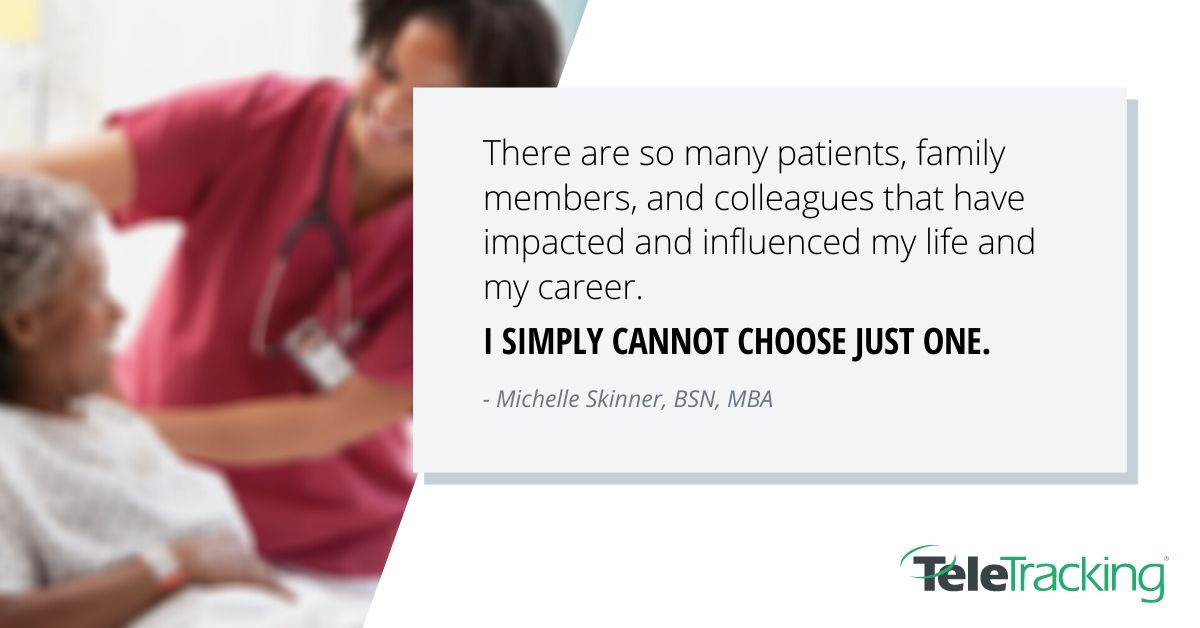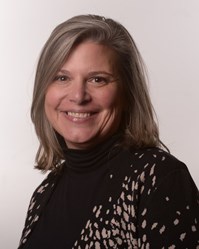Michelle Skinner, BSN, MBA, Director, Health Systems—A Year Long Celebration of Nurses
We started this blog series in January as a way to recognize the nurses that we have the honor of working with every day―and to be a part of the World Health Organization’s designation of 2020 as the “Year of the Nurse and Midwife.” We always knew that nurses around the globe deliver kind, compassionate care to patients in their times of greatest need—they hold the hand of an elderly patient; dry the tears of a frightened child; and comfort grieving family members. With the COVID-19 pandemic, nurses and all healthcare professionals are on the frontlines―continuing to serve, continuing to deliver care and continuing to be there for their communities during the greatest public health crisis in a century. Our sincerest thanks to the nurses who are working hard—under very difficult conditions—to ensure that no one will ever have to wait for the care they need.
This month, we’re pleased to feature Michelle Skinner, BSN, MBA, Director, Health Systems at TeleTracking. Michelle has worked in a wide range of nursing disciplines, including as a critical care transport nurse, trauma program manager, vice president of trauma services and associate CNO.

1. Why did you decide to become a nurse?
I was a candy striper (now known as a junior volunteer) when I was in my mid-teens. I enjoyed this connection to healthcare, but it didn’t immediately spark an interest in nursing. I always thought that I wanted to be a kindergarten teacher—until I had the opportunity to do an internship at an elementary school. I quickly realized that I was not going to be a kindergarten teacher and started the process of figuring out what was next for me. I began working in patient registration in the ER on the night shift. It was interesting and the camaraderie in the workplace was amazing. I quickly realized that nursing was my career path and I never looked back!
2. What are the biggest differences you’ve seen in the profession since you started your career?
During nursing school, I worked as a unit secretary, and eventually, as a tech in the ICU and ED. I really loved the hustle and bustle of those departments and never imagined leaving the bedside. When I graduated from nursing school, I spent a few years at the bedside, but moved quickly into leadership positions where I found my ability to influence the delivery of healthcare on a much broader level. As my career has advanced, I am constantly amazed by the opportunities nursing has afforded me. The evolution of nursing has remained one of caregiver, healer, and trusted advocate—with a holistic view of health and well-being. However, the profession now also encompasses the roles of policy influencer, educator, advocacy leader, and care innovator, to name just a few. The possibilities of nursing are limitless and just continue to grow.
3. What is the biggest challenge(s) facing nurses today?
Voice. Elevating the practice and profession of nursing allows nurses’ voice to be heard. We know that those closest to the problem likely have the solution—yet the voice of the nurse is often not heard in many situations. This can apply to workplace violence and safety, workload, healthcare policy, care delivery models, healthcare technology development, and so much more! Finding our professional voice is key to overcoming the current and future challenges facing our profession. Nurses are scientists and can approach problems scientifically when provided the platform and the expectation to succeed.
4. What do you think can be done to solve the nursing shortage?
Elevating the practice and profession of nursing may be a key to solving the nursing shortage. When nurses are encouraged and allowed to practice at the top of their license, they often feel greater satisfaction with their work while simultaneously defining their role in the healthcare system. This type of role definition accommodates both an increase in support roles and a broader care delivery model. Practice elevation may also lead to increased career satisfaction for nurses.
5. Share a patient story that has impacted you personally.
There are so many patients, family members, and colleagues that have impacted and influenced my life and my career. I simply cannot choose just one.
6. The World Health Organization has designated 2020 the International Year of the Nurse and the Midwife. Why is this type of recognition so important?
Nursing is the core of healthcare. Nurses are trained to view health and well-being holistically—not just sick care, but well care, community care, family care, emotional care, and more. We provide a voice and advocate for our patients when they are unable to advocate for themselves or find their voice. This places nurses in the most integral moments in life—birth, death, despair, joy, pain, and fear. Elevating and providing visibility to nurses, midwives and the profession of nursing is critical to highlighting nursing as a profession and ensuring its future. There is not a moment to be wasted.
7. How does TeleTracking help nurses and other health professionals deliver a better patient experience?
Studies show that technology often peels time away from care. TeleTracking does not follow this pattern. We help nurses and other health professionals get time back by giving them time back at the bedside to provide engaged, compassionate care. TeleTracking increases visibility, eliminates redundancy, and provides transparency across the entire continuum of care.
More about this blog post
About the Expert
 Michelle Skinner, BSN, MBA
Michelle Skinner, BSN, MBA
Director, health systems
We're glad you're enjoying our resources! Please tell us more about you to access our full library.
This will allow us to personalize your experience on TeleTracking.com. Of course, we will never sell your information and you can opt-out at any time. Need help now? Contact a Patient Flow expert.
Leaving the website
You're about to leave this website, to one of our affiliates or another information source.